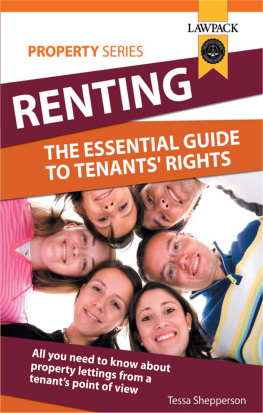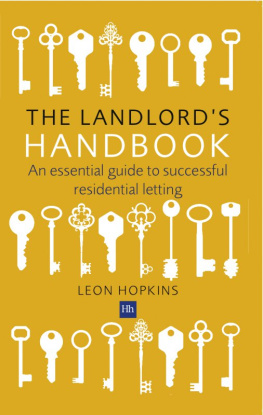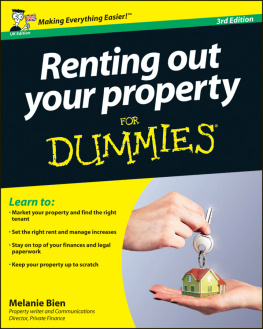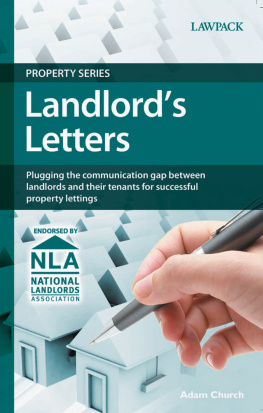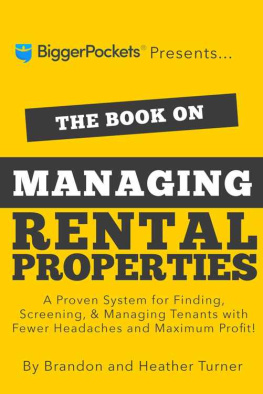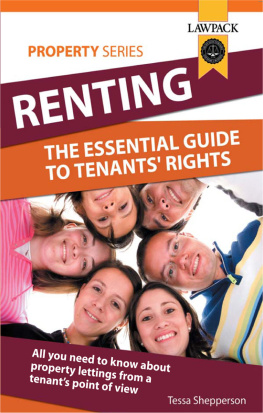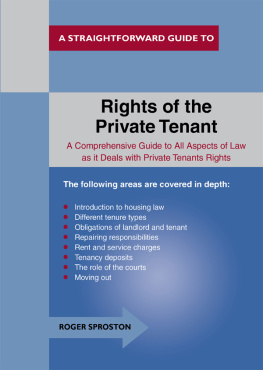
RENTING:
THE ESSENTIAL GUIDE TO TENANTS RIGHTS
Tessa Shepperson
Renting: The Essential Guide to Tenants Rights
by Tessa Shepperson
1st edition 2007
Reprinted 2008
2008 Teresa Jeanette Gee
Lawpack Publishing Limited
7689 Alscot Road
London SE1 3AW
www.lawpack.co.uk
The right of Teresa Jeanette Gee to be identified as the author of this work in the name of Tessa Shepperson has been asserted by her in accordance with the Copyright, Designs and Patents Act 1988.
All rights reserved
Printed in Great Britain
ISBN: 978-1-905261-26-0
Exclusion of Liability and Disclaimer
While every effort has been made to ensure that this Lawpack publication provides accurate and expert guidance, it is impossible to predict all the circumstances in which it may be used. Accordingly, neither the publisher, author, retailer, nor any other suppliers shall be liable to any person or entity with respect to any loss or damage caused or alleged to be caused by the information contained in or omitted from this Lawpack publication.
For convenience (and for no other reason) him, he and his have been used throughout and should be read to include her, she and her.
About the author
Tessa Shepperson is a solicitor in private practice. She qualified in 1990 and set up her own legal practice, TJ Shepperson, in 1994. Tessa specialises in residential landlord and tenant work, and runs the well-known legal information site Landlord-Law (www.landlordlaw.co.uk), which provides legal information and services for residential landlords and tenants. Tessa lives in Norwich with her husband and son.
Introduction
Despite the optimistic statements issued by government ministers and the Legal Services Commission, it is becoming increasingly difficult for ordinary people to find professional legal advice on housing matters at a reasonable cost. It is essential, therefore, that there are good, alternative sources of information available to help tenants who have no option but to deal with things themselves. There are many excellent online resources (some free of charge) but I think there is still a place for a decent printed handbook which can be carried about and read on the bus.
I was very pleased to be asked to write this guide for tenants. As a result of the increasing shortage of housing advice available, I have gone into quite a lot of detail to help tenants understand and then enforce their rights. Law is a complex and difficult subject and if the information given is to be of any practical use, there is a limit to how far it can be simplified. Most people should have no trouble understanding the information given in this book, although they may have to read parts of it several times.
I have chosen a different way of presenting legal information on housing matters to that traditionally used, which I hope will be more helpful for the ordinary person. To start with, if you are to fully understand tenants rights in housing law, you need to have some background information, the sort of thing that most solicitors (or at least most housing solicitors) will know as a matter of course. This background information is given in the various sections of . You will also find in this section a worksheet for you to fill in to work out the type of tenancy you have. This is important, as your rights will often depend on your tenancy type.
However, what most tenants want to know is What are my rights? and this is the focus of looked at housing law and tried to work out what are the most important legal rights available to tenants. These are then described in some detail, followed in most cases with a remedies section where you can find out how to enforce them (as it is an axiom of our legal system that if you have a right you should also have a remedy to enforce it), and a further information section which will give relevant sources of help and advice.
As you might expect, the most important and largest sections are on matters relating to disrepair, and tenants rights regarding harassment and eviction, although the right to be treated fairly looking at tenancy agreements and rent matters is also pretty fundamental. These areas of law are very complex, mainly because different types of tenancy are treated in different ways and there are such a lot of different statutes involved. I have done the best I can.
I also thought it would be helpful to have a general description of a tenancy from start to finish, and this is given in gives important information on complaints procedures and how to obtain legal advice.
You will also see quite a few questions and answers (Q&As) scattered through the book. For quite a few years I have run a legal information website on housing law called Landlord-Law at www.landlordlaw.co.uk. One of the most popular parts of this site is the Q&A section where every two weeks I answer ten questions submitted to me by readers. I have taken the questions and answers from here. They are all genuine questions, although I have amended them slightly and removed anything which might disclose the identity of the authors. As they are real questions, they set the legal information in this book in a real-life context, and also serve to illustrate some points not specifically covered elsewhere in the text.
Who are you?
This book is aimed at tenants, although it will also be useful for housing advisers and landlords. Here are some tips for various potential users of the book:
Social tenants (i.e. tenants of local authorities, housing associations, and other registered social landlords) most of this book will be relevant to you, save the sections aimed at tenants of private landlords.
Private tenants again, most of the book will be relevant to you, save for the sections aimed at tenants of social landlords. However, it is particularly important that you work out what type of tenancy you have, for example before tackling the section on eviction in .
Students the type of tenancy you have will depend on whether you are renting from your college/university or from a private landlord. Have a look at the section on background information on tenancies in to find out which is appropriate for you, and use the rest of the book accordingly.
Landlords hopefully this book should be useful for you as it is always helpful to know what advice is being given to your tenants! Private landlords, in particular, may find it a useful source of information on their legal obligations to their tenants.
Advisers as this book is aimed at a lay audience, I have not included the numerous references which are an important part of the practitioners textbook, although there are still a lot of statutory references and I have mentioned a few of the most important cases (and others are referred to but not named see if you can spot them!). Even so the book should still be useful to you as a basic guide, particularly if you are not experienced in this area of law. Hopefully, once you have an understanding of the basics, you will be better able to tackle the less digestible practitioners tomes.
Whoever you are, I hope that this book will be useful for you. Good luck with your case!
Acknowledgements
I am grateful to my publishers for commissioning this book and to my editors Jamie Ross and in particular Nadine De Souza, for her helpful comments and suggestions during the revision process. Thanks also to all my landlord and tenant clients and the members of my website www.landlordlaw.co.uk who have shared their problems with me, which has helped inform me when writing this book, and to Giles Peaker for his helpful suggestions. Finally, enormous thanks to my husband Graeme for putting up with me while I was writing, and also for his help (as a former councillor) with the complaints section. However, any remaining errors are of course mine alone.
Next page
